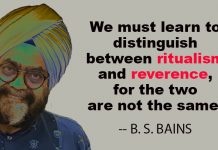| Book Review | Malaysia | 16 Aug 2017 | Asia Samachar |
Book Title: SIKH-ING: Success and Happiness
Author: Dya Singh, World Music Group, Adelaide, Australia
Publisher: Sanbun Publishers, New Delhi
Year of Publication: 2016; Price: Rs. 395; Pages: 192 (Paperback).
 By Gurpal Singh Bhuller
By Gurpal Singh Bhuller
Thomas Merton once wrote ‘My soul does not find itself unless it acts….stagnation and inactivity bring spiritual death”. Although Merton was a devout Christian, his words apply to Sikhi also.
There are however, few writings by contemporary Sikhs of their own journey. This book by Dya Singh is the story of his acts, and how he has travelled the spiritual path of Sikhi and what he has learnt.
In the Sikh tradition, there are of course writings of great and accomplished Sikhs or “Brahm Gianis” who described their own journey and struggles. (e.g. Bhai Randhir Singh Ji, Sant Isher Singh Ji, Sant Sohan Singh Ji). Most are written in Punjabi. They are dense and require much time, ample powers of concentration and a deep knowledge of Gurmukhi. Exposure to Gurbani concepts is also needed to understand these writings. Their stories are of those who had intense devotion and were written 75-200 years ago.
This volume though is totally different, though it treads a similar path. This is the journey that Merton describes but written by a Sikh from the Diaspora.
Dya Singh is a child of the Diaspora – his father grew up in India and then migrated to Malaya (now Malaysia). Dya grew up in Malaysia where he received his initial teachings of Gurbani and Gurmukhi. After finishing his schooling, he left for England where he took up accountancy.
He ended up settling in Australia where he now lives with his children and grandchildren. Here he has become an accomplished musician and a “kirtanyia” of Gurbani, exploring it with new tunes and melodies and introducing us to different non-traditional instruments.
SEE ALSO: Dya Singh comes across original, practical in his latest work
His writing is thus suffused with the experiences of those who have grown up in the “non-Indian” environment.
The book starts with the exploration of the two words, “mann” (the Mind) and “muth” (Sense of the mind) and moves on to his understanding of God. Here he does not follow the standard “mool mantar” definition, but introduces instead ideas that the term implies – Universality and Goodness.
Then he tackles the current fascination with “happiness”. He follows the path of Sikhi, explores the concept and includes “Santokh” as a form of happiness (although it is traditionally understood as freedom from desire, or Contentement). He concludes this section on happiness with a discussion of Charhdi Kala – the positive state of wellbeing which is part of the Sikh ethos.
How do you get to that? Dya uses meditation and mindfulness as a tool in getting to that state. He also uses exercises throughout the book to encourage the reader’s involvement. He concludes with reflections on how he has tackled Eastern and Western values and links Detachment to eventual happiness.
The book concludes with Supplementary Chapters that are meant for those not familiar with the Sikh faith. These are his takes on Sikh History, Kirtan and Naam Simran. These chapters detract from the general tone of the book and perhaps could have been part of a second volume.
Sprinkled throughout this book are anecdotes that he has picked up and uses them to illustrate some points. There are many quotes of Gurbani, with transliteration and translations together with references to the particular page of the SGGS. The transliterations are not standard and it may have been better if the original Gurbani quote in Gurmukhi had been provided.
Despite this, it is a refreshing book and it will be a wonderful guide to all those exploring the spiritual side of Sikhi. Records of these personal journeys are important and relevant to the Sikh community that has grown and flourished outside India. Reading this is like being part of a “sangat”. It is an important story of how we, being children of the Diaspora, record our own narrative as we form our own perceptions of Sikhi. These stories light the path that we travel.
As David Brooks said, “The best life is oriented around the increasing excellence of the human soul”. This book is an example of how that is done in the Sikh way, and deserves to be read by all those interested in personal growth.
Dr Gurpal Singh Bhuller, born a fellow Malaysian like Dya Singh, now lives in the United States
[ASIA SAMACHAR is an online newspaper for Sikhs in Southeast Asia and surrounding countries. We have a Facebook page, do give it a LIKE. Follow us on Twitter. Visit our website: www.asiasamachar.com]
RELATED STORIES:
Dya Singh comes across original, practical in his latest work (Asia Samachar, 12 Aug 2017)
Sava-Lakh: Aussie Sikhs come of age (Asia Samachar, 4 July 2017)
[The fastest way to reach Asia Samachar is by sending us a Facebook message. For obituary announcements, click here]




































